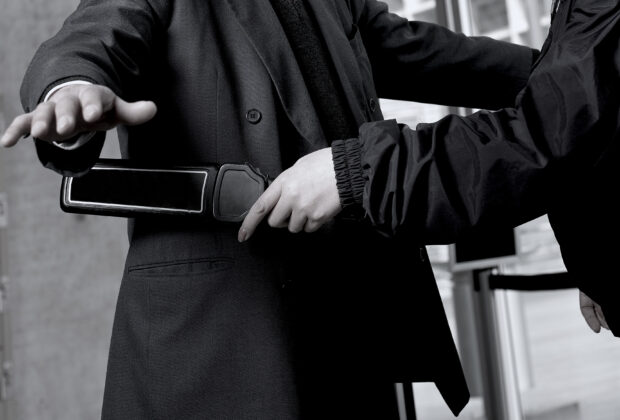Getting a career in the security industry is easier than you think.
This in-depth guide will explain the ins and outs of working in the security industry and how you can start on your journey to become a security professional today. If you’re looking for a job as a security guard in Canada, make sure you read through to see what you need to do, and how to do it.
The Canadian Academy of Guard Training’s industry-leading online courses will prepare you for an exciting, challenging and rewarding career as a security professional in Canada.
This guide will teach you everything you need to know to start working in the security sector fast. From required personality traits to salary expectations and scope of work, after reading this comprehensive guide you will be ready to become a Canadian security guard in no time.
What Do You Need to Get Started?
The path to becoming a security guard in Canada is easier than you may think. To first determine if a career in security is right for you, let’s discuss personality traits that often lead to success in the industry. Security professionals are the first line of defence for the public’s safety in private institutions and businesses across the country, to be successful in the role you will need to be comfortable in often stressful situations. Desirable traits for security professionals include, but are not limited to:
- Dedication – As a security professional you are the first line of defence protecting the public from any threats that may arise. To properly succeed in this role, you will need to be dedicated to providing the best protective services at all times.
- Empathy – Showing members of the public empathy while in a security role is vital to your overall success. As a security professional you will often encounter individuals in difficult circumstances; showing these individuals empathy in tough situations will lead to a more successful security career.
- Passion – The security industry can often involve difficult, laborious or even boring days. However, there will also be days filled with excitement, and amazing opportunities. To succeed in this role, you will need to be passionate about the services you provide and the opportunities you are given.
- Courage – Courage is one of the most important traits of any security professional. In the course of your work, you may encounter potentially dangerous or difficult to approach situations. Being courageous, but also smart about how to handle these situations will lead to a more successful security career.
- Patience– Although a career in security can provide amazing opportunities with exciting, challenging and rewarding days – it can also be an industry with days that are monotonous and slow-moving. Having patience will allow you to deal with these slow days from a more professional standpoint.
- Reliability – Companies rely on security professionals to protect important assets. Being entrusted with this level of responsibility means successful security professionals must be easily relied upon to be punctual and reliable to carry out their required duties.
Ready to Start Your Career in the Security Sector?
Start your online training today!
Steps to Becoming a Security Professional
1
Legal Working Age
The first necessary step to becoming a working security professional in Canada is being a legal age to fill the role. The legal age for security professionals in Canada varies by province.18 is the required age in all provinces except in Newfoundland, Nova Scotia and British Columbia which all require workers to be at least 19 years of age.
2
Prerequisites by Province
Many provinces in Canada have varying regulations to become a working security professional. In New Brunswick you have to be employed by a security guard company before applying for a security license.In Alberta and British Columbia you must be fluent in English to apply for a security position.It is also important to note that you should have a clean Canadian criminal record to enter the security sector. If your position requires you to operate a vehicle, you may also need a clean driving record.
3
Training Requirements
Many provinces and territories require you to complete a 40-hour security training program. After you have finished the 40 hours of security education you will receive a training completion number, which you will use to register for the provincial security guard test. After successfully completing the test, you will need to apply for a security licence with your province or territory. Once the security licence has been issued and mailed to you, you will be able to begin your career in security.
The provincial security guard test ranges in price from $25 to $50 per exam, depending on your province. You are allowed up to three attempts to pass the exam, and after the third attempt you will have to complete the training program again.
What is Security Guard Training?
To become a licensed security guard, you need government approved training — that’s where the Canadian Academy of Guard Training comes in.
Students who participate in security industry training through the Canadian Academy of Guard Training will learn:
- The Role of a Security Guard
- The Law and Your Rights and Responsibilities
- Crowd Control
- Powers of Arrest
- Dealing with Angry and/or Disturbed People
- Patrol Techniques
- Use of Force
- First Aid
Online training through the Canadian Academy of Guard Training begins as soon as you register. You will be able to learn at your own speed and finish whenever you choose. You are able to access course materials 24/7, and when you feel ready, take the licensing exam.
Salary Expectations in the Security Sector
Average Canadian Security Guard Salaries
The salary of a security guard can depend on location and responsibilities.
According to the Department of Employment and Social Development Canada:
- Hourly pay for security guards ranges from $11.50 to $24.86
- The median hourly wage* is $15.96
These hourly wages are based on 2016-2017 data from Statistics Canada. (See table below from the Government of Canada Job Bank site.) Across Canada there have been minimum wage increases in 2018. The hourly wage for security guards will reflect this change.
What Equipment Will You Use?
Security professionals are reliant upon their equipment to efficiently carry out their daily tasks and prevent serious incidents from occurring.
The following are common pieces of equipment a majority of security professionals use daily.
- Mobile phone – Although almost every security guard will still utilize a radio on a daily basis, a mobile phone can be a great way to communicate and access pre-programmed important numbers.
- Less-lethal weapons – To protect the public, you may be authorized to carry less-lethal weapons while on duty. These weapons may include batons, pepper spray or stun guns.
- Security clothing – The clothing that a security professional is required or expected to wear may differ based on the position and employer, but generally these key pieces of equipment can help make you safer while on duty.
- Bullet-proof vest: Not every security professional will be in situations where this piece of equipment is required. However, many in the industry rely on this single piece of equipment every day to protect their lives.
- Boots: Although a great pair of work boots may not keep you safe from bullets, they will save you over the long run as a security professional. Many security guards are expected to spend prolonged amounts of time on their feet and investing in a high-quality set of boots can save you from a life of back and leg pain.
- High-visibility clothing: As a security professional, you should stand out from the general public. Distinguishing yourself from the public will make it easier for you to be called upon when there are issues requiring a security professional’s attention. This can vary depending on your position, however.
Career Advancement in the Security Sector
Security guards can advance to more senior positions in security.
Experienced, qualified security guards can become:
- Supervisors
- Team Leaders
- Trainers
- Managers
- Security specialists
- Directors
- Heads of Security
Many of these jobs are very well paid. A typical supervisor job role pays $35 per hour, according to Indeed.ca. Many management/team lead positions pay about $50,000 per year.
If you prefer to branch out, you might apply for work in related fields, for example with job titles like:
- Private investigator
- Sheriff
- Special constable
- Peace officer
- Protective services officer
- Enforcement officer
- Transit safety officer
- Correctional officer
- Parking enforcement
- Transit fare inspector
Get Started Now!
The start of your career in the security sector is closer than you think! To get started, browse the wide array of available courses made possible through the Canadian Academy of Guard Training here.




Comments are closed.